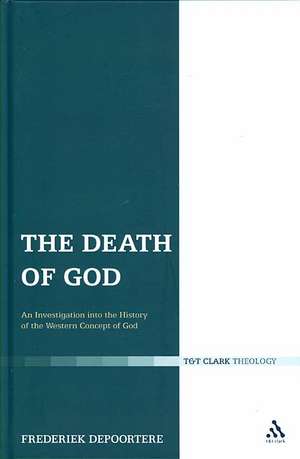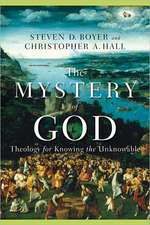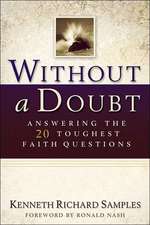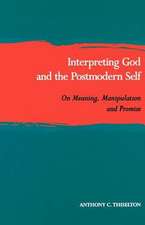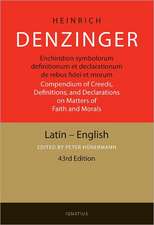The Death of God: An Investigation into the History of the Western Concept of God
Autor Frederiek Depoortereen Limba Engleză Hardback – 27 feb 2008
Preț: 889.71 lei
Preț vechi: 1140.59 lei
-22% Nou
Puncte Express: 1335
Preț estimativ în valută:
170.26€ • 176.75$ • 141.97£
170.26€ • 176.75$ • 141.97£
Carte tipărită la comandă
Livrare economică 22 martie-05 aprilie
Preluare comenzi: 021 569.72.76
Specificații
ISBN-13: 9780567032720
ISBN-10: 0567032728
Pagini: 224
Dimensiuni: 156 x 234 x 23 mm
Greutate: 0.47 kg
Editura: Bloomsbury Publishing
Colecția T&T Clark
Locul publicării:London, United Kingdom
ISBN-10: 0567032728
Pagini: 224
Dimensiuni: 156 x 234 x 23 mm
Greutate: 0.47 kg
Editura: Bloomsbury Publishing
Colecția T&T Clark
Locul publicării:London, United Kingdom
Caracteristici
Provides a fascinations and fresh investigation into the development of theology and philosophy as well as the concept of the 'Death of God'
Cuprins
Introduction: Have We Taken Nietzsche Seriously Enough? Nietzsche's Proclamation of the Death of God Revisited1. Who (or What) Is Dead When God Has Died?2. God, the Ultimate Foundation3. The Death of God: The End of All Foundations 4. Conclusion: The End of Transcendence Elements from the History of the Western Concept of God from its Greek Origins until the Fourteenth Century1. The Origins of the Western Concept of God in Pre-Socratic Philosophy 2. The God of Plato, Aristotle, the Stoics and the Platonists after Plato a. God in Plato's Philosophy b. God in Aristotle's Philosophy c. God in Stoic Philosophy d. God in the Philosophy of the Platonists after Plato e. Conclusion: The Legacy of Greek Natural Theology 3. Augustine's Synthesis of Neoplatonism and Biblical Faith 4. The Medieval Synthesis: From Augustine to Aquinas 5. The Breakdown of the Medieval Synthesis 6. Summary Descartes, Divine Omnipotence, and the Theological Origins of Modernity 1. Divine Omnipotence in the Bible 2. Divine Omnipotence in the Patristic Era 3. Divine Omnipotence in the Christian Philosophy of the Middle Ages a. Divine Omnipotence within the Limits of God's Nature (Peter Damian and Anselm of Canterbury) b. The World as a Necessary Emanation from the Good (Peter Abelard) c. Meeting Abelard's Challenge: The Distinction between God's Ordained Power and His Absolute Power 4. The Theological Origins of Modernity Evaluated a. Gillespie's Thesis Questioned b. An Alternative Explanation of Descartes's Deceiving God c. Divine Omnipotence in Descartes: The Doctrine of the Creation of the Eternal Truths 5. Summary and Conclusion 4. Modern Science and the Disappearance of God from Western Culture 1. From Analogy to Univocity: The Beginning of the End for God in the West? 2. The Emergence of the Concept of Natura Pura in Scholastic Thought a. The Problematization of the Natural Desire to See God b. A New Understanding of the Causal Relation between God and Creation c. Conclusion 3. Personal Immortality and the Autonomy of Natural Philosophy4. Protestantism, Biblical Literalism and the Rise of Modern Science5. Modern Science and the Problematization of God's Presence6. The Dialectical Origins of Modern Atheism Luther, Hegel, and the Death of God 1. The Origins of the Phrase 'God Is Dead!' in Lutheran Theology a. The Chalcedonian Definition of the Faith b. The Doctrine of the Communicatio Idiomatum c. Luther's Re-interpretation of the Communicatio Idiomatum 2. The Meaning of the Phrase 'God Himself Is Dead' in Hegel a. Enlightenment Philosophy and 'the Feeling that God Himself Is Dead' b. 'The Feeling that God Himself Is Dead' as Basis of 'the Religion of More Recent Times' c. 'The Feeling that God Himself Is Dead' as an Inducement to Philosophy to Transform Itself 3. The Death of God: From Luther to Nietzsche via Hegel 4. Protestantism and the Rise of Modern Atheism: A Note on the Relevance of the Theme of the Death of God General Conclusion
Recenzii
"It seems to me that the author presents a fascinating and clearly developed account of how it was that philosophy in the West came to a place where the concept of God was considered to be redundant. Such a project must of necessity grapple with an array of complex movements and developments within Western thought over a period of some two thousand years and this has been done proficiently. He chooses his interlocutors well and offers scholarly and informative analyses of their central ideas as they relate to his theme. The breadth of sources and the depth of issues requires remarkable skill and insight... I am sure there are many who will be engaged, enlightened and encouraged to think further by this serious study as it grapples with the relation of Greek philosophy to Christian belief in the history of Western thought." Alan Spence
"This volume, [Depoortere's] first in English, provides the grounds for his later post-structuralist work. It explains... how it could happen that God died sometime during the history of Western thought." Theologische Literaturzeitung 134 (2009) 12
"Frederiek Depoortere's slim volume is an expansive history of the Western concept of God, from the Milesians to Nietzsche, with particular attention to 'how we have lost God in the West (viii).'...Depoortere has written a refreshing, interesting, and courageous volume. Well-written and well-edited, it is an informative source for students of theology and philosophy. Depoortere also shows signs of humor--look for references to Humphrey Bogart and Ingrid Bergman!" -Gesa Elsbeth Thiessen, Theological Studies, Sept. 2009
"This volume, [Depoortere's] first in English, provides the grounds for his later post-structuralist work. It explains... how it could happen that God died sometime during the history of Western thought." Theologische Literaturzeitung 134 (2009) 12
"Frederiek Depoortere's slim volume is an expansive history of the Western concept of God, from the Milesians to Nietzsche, with particular attention to 'how we have lost God in the West (viii).'...Depoortere has written a refreshing, interesting, and courageous volume. Well-written and well-edited, it is an informative source for students of theology and philosophy. Depoortere also shows signs of humor--look for references to Humphrey Bogart and Ingrid Bergman!" -Gesa Elsbeth Thiessen, Theological Studies, Sept. 2009
